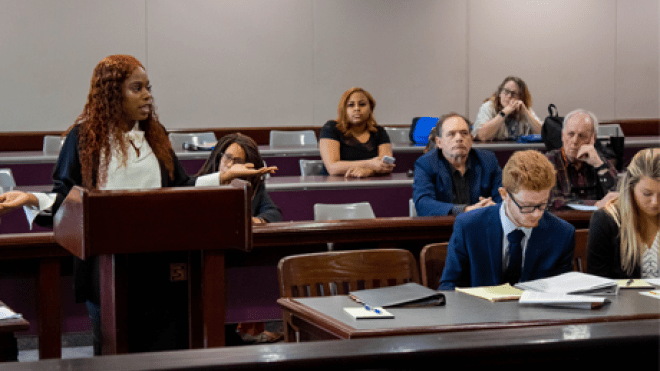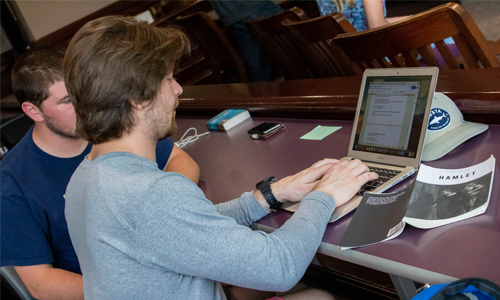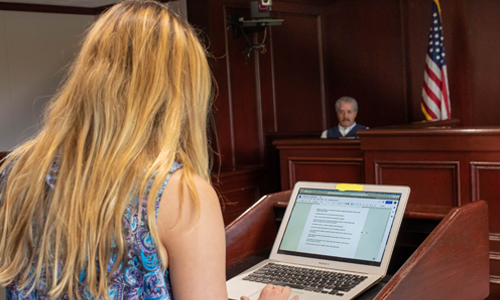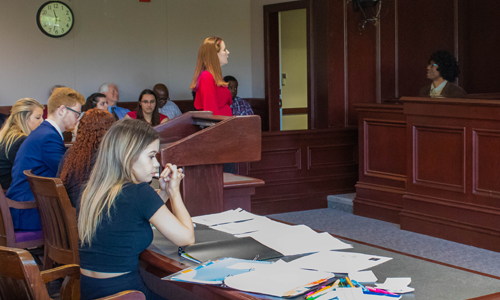RWU Students Take Shakespeare to the Courtroom
In this interdisciplinary legal studies course, students learned valuable law techniques while putting popular Shakespearean characters on trial

BRISTOL, R.I. — Many of us are used to seeing Shakespeare stories such as Hamlet and Macbeth reenacted time and time again on the theater stage. But in this interdisciplinary legal studies course, 13 students studied these popular tales from a whole new perspective and brought Shakespeare to the courtroom.
As an English literature major and attorney, assistant professor of legal studies Eve Brown aimed to combine her two passions while giving students real, hands-on experience with legal techniques such as direct questioning, closing arguments and cross-examining witnesses through a mock trial.

“I really believe students learn best by doing rather than just hearing and a lot of times when we give them exercises that simulate law, they’re kind of one-dimensional, hypothetical situations,” Brown said. “I thought if we brought literature into it and have that be the basis for mock trial, we have these characters with backgrounds and quotes and they have this whole wealth of literature critiquing Shakespeare and all this information they can draw from.”
From the first day of class, the students picked the characters they wished to prosecute, picked the theme and theory of their case and broke into prosecution and defense teams.
“I didn’t know anything about Hamlet, but I knew the mock trial aspect of it,” said senior political science major Alivia Casillas who has also been a member of RWU’s mock trial team for the last two years. “I love everything about mock trial. When we get in there it’s just fun for me. The objections and breaking down case material, coming up with ulterior motives and poking holes, it’s a game for me and I love that aspect of trial.”
This year’s class chose to prosecute Claudius from Hamlet and Lady Macbeth from Macbeth. Both defendants pleaded not guilty.

In order to create a true-to-life mock trial and give the students experience in working with individuals who don’t study law,RWU professors, theater students and members from a Shakespeare reading group volunteered to take part as witnesses. To readily prepare them for trial, Brown’s students had to meet and coach the witnesses, go over each of their depositions and train them to properly answer questions when they’re on the stand.
For Casillas, who will be attending RWU Law next fall, taking part in these mock trials throughout her undergraduate career has given her a large amount of experience in the type of work she may be doing in the future, especially working with witnesses.
“With the witnesses, I tried to give them tips on how to answer a question a certain way so they could prevent getting objected. But at the same time, it’s about knowing that in real life witnesses don’t know how trials work, they don’t know how court works,” Casillas said. “Things like objections, leading questions, directing and crossing, I would have had no idea what those were until I got into law school if it weren’t for mock trial. It’s definitely been a huge stepping stone for me."

Brown’s main goal for the course was to show her students to start thinking like lawyers, getting them to problem solve, analyze, critically think and present persuasive arguments. But she also hopes the course goes beyond teaching her students the legal skills and shows them how much of an impact art can have, even when practicing law.
“Once you get to law school, even if you do mock trial it’s pretty structured in terms of giving you a hypothetical that has to do with law. Whereas with undergrad I think we have a bit more freedom to really delve into the liberal arts side and really be interdisciplinary,” Brown said. “Art reflects life and our emotions and I think it’s a good way to examine things like motivation and the human side of something. Where yes, you’re practicing law, but it’s also a story. Your clients have stories and you’re the one telling that story.”
As for the final verdicts, both Claudius and Lady Macbeth were found guilty of murder, and Brown’s students are walking away with the experience and skills they will need to succeed as future law practitioners.